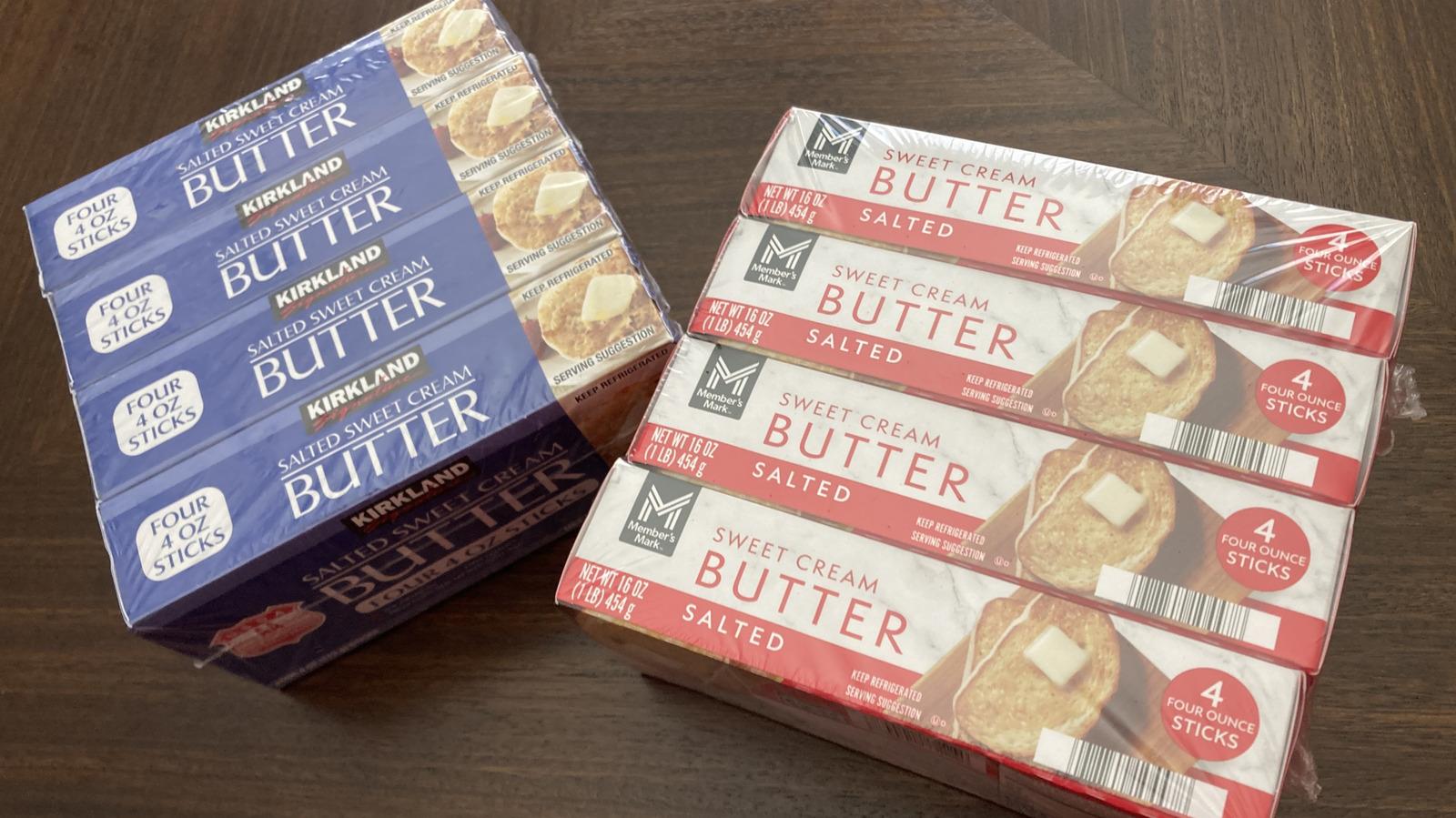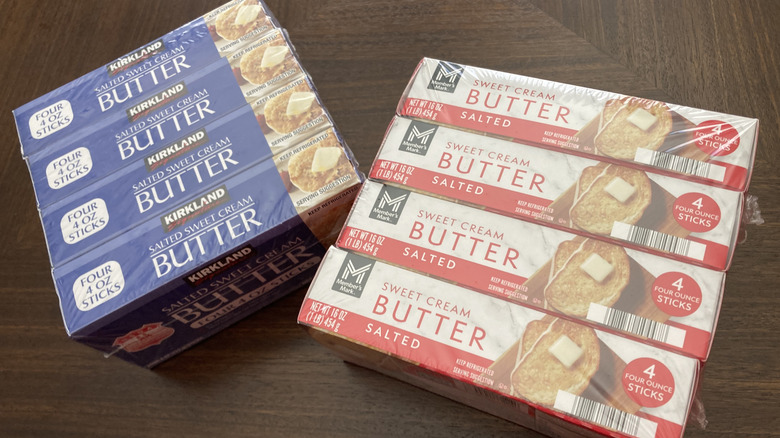
Steven Luna/Mashed
Whether you bake with it, spread it on toast, or use it to fry eggs and make vegetables more flavorful, there's no getting around the need for butter in the kitchen. But it can be rather costly, which is why it's nice to know that both Costco and Sam's Club offer Signature brands of their own butter to help keep prices manageable. This is especially helpful when the holidays hit and your baking practices turn your kitchen into a makeshift cookie factory, the moment butter becomes a commodity no self-respecting baker can do without.
Maybe there's an advantage to Costco's Kirkland butter that Sam's Club's members Mark butter just can't provide, or maybe it's Sam's Club's refrigerated cubes that help you level up your kitchen skills. To put the argument to rest, I scooped up a package of chain branded butters from both warehouse stores and unwrapped the truth about whether you have a better butter purchase when buying from Costco or Sam's Club. Then, I put the two through a comparison to see which one isn't just the best buy, but also which one gives the best results when you're looking for classic butter performance. And yes, classic butter performance is a thing. Any home cook can attest to this. While there may be obvious differences between items found in the Costco and Sam's Club delis and the Costco and Sam's Club meat departments, butter from the two chains is a whole different story.
Both butters are made from the same two ingredients
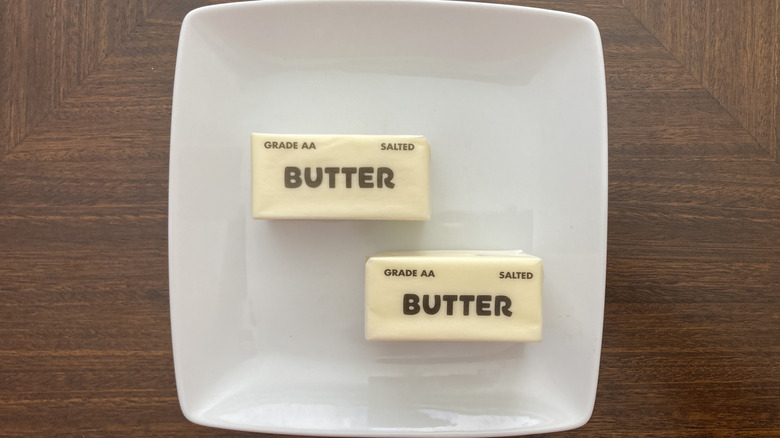
Steven Luna/Mashed
How many different ingredients can butter possibly have? It depends entirely on the brand, type, and formulation favored by the producer. Higher quality ingredients will of course result in a better butter, though beyond this, simplicity is the best rule to follow to keep the substance from becoming cluttered with unnecessary elements. Though you may find 18 different types of butter sitting in the dairy section of most chain grocers, all with their own ideas of what butter should be, the truest butters contain nothing but cream, air, and a bit of salt to heighten the flavor. Simple, right?
Yes ... so simple that both Costco and Sam's Club stick to the very same elements, pasteurized sweet cream and salt — that's it, for both warehouse butters. While that might be a relief to conscientious shoppers trying to keep to their cleaner eating arrangements, it makes comparing the two incredibly difficult. How can you draw a contrast between two butters made from the same components? The best I can do is say that you get a great prim-and-trim recipe from both Kirkland and Member's Mark, which gives both brands a level playing field from the jump.
Costco's butter tastes slightly sweeter than Sam's Club's

Steven Luna/Mashed
It may have just been my taste buds, considering that both butters are made from exactly the same ingredients, but the Costco butter had a sweeter taste than Sam's Club. Granted, pasteurized cream from two different cows onto two different farms process through two different food producers can equate two wildly different taste profiles, but I was really expecting butter to taste like butter no matter the wrapper on it. More than just exposing my ignorance to how complex butters can be, it also shows how the Costco fan base can become convinced that their warehouse produces better butter than Sam's Club does.
In truth, both taste great — rich and buttery with just enough salt to balance the spectrum beautifully. But if sweet in sweet cream butter is the whole objective, Costco would be a wiser purchase for that purpose. However, the difference is negligible, and shoppers who compared them side-by-side wouldn't notice enough contrast to call one better than the other.
The texture is the same between both butters
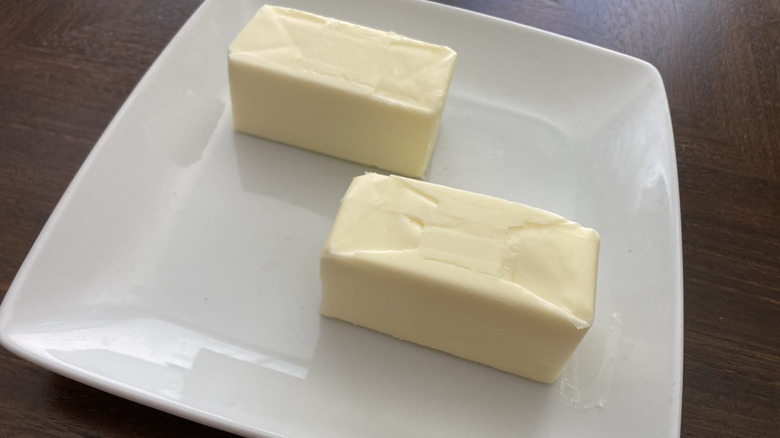
Steven Luna/Mashed
The similarity between the texture and consistency these two butters is uncanny, which may just be the nature of butter. The texture is equally silky, and the consistency is identical, which made keeping track of the two different butters a little tricky. The good news about having such similar sweet cream butters available at Costco and Sam's Club is that no matter which one you prefer, you'll have a winning texture to work with. That's sweet relief to cooks who know textural predictability means dependable results in their finished dishes.
The bad news is ... well, there's actually no bad news on the texture front, unless you're dead-set on having a favorite so you can crow to your Costco-shopping friends and neighbors about your beloved Sam's Club having the better butter, or vice-versa. There are no bragging rights for either of you in the butter sector. You'll both be getting a fantastic product with taste that measures up to the timeless spirit of fresh butter made from minimal ingredients.
Both Costco and Sam's Club butters melt wonderfully
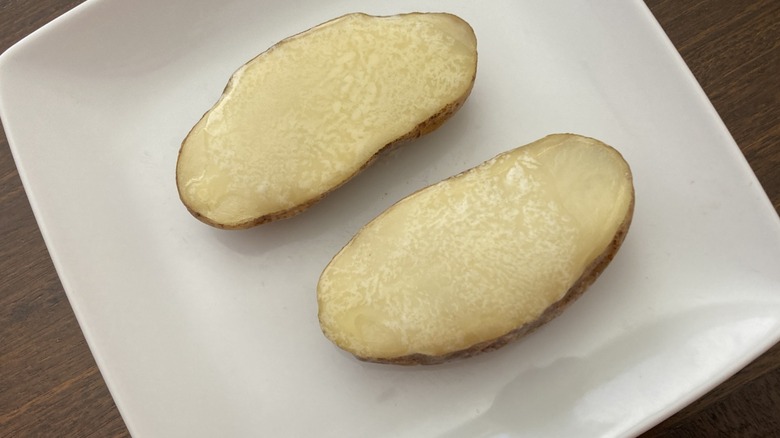
Steven Luna/Mashed
To make sure that both Costco and Sam's club sweet cream butters were used in the same methods they would be in real kitchen situations, I gave both brands the meltability test using halves of a baked potato. Since this is a standard use where the buttery essence takes on very specific requirements, namely the ability to melt smoothly and evenly when heat is applied, I knew it would tell me whether or not Costco and Sam's Club butters fare well under fiery conditions.
To conduct the test, I laid half of a tablespoon-sized potato of butter in the center of each potato half and watched as they melted, with an eye on the amount of time it took for the melting to be complete and how the butter appeared in its fully melted state. Both Costco and Sam's Club butters were fully melted in under one minute, and both turned into a glossy, translucent golden oil. In essence, both butters performed admirably when a smooth and speedy melt was required. This is not surprising, considering they both seem to be comprised of similar materials, but watching the process happen from start to finish revealed the equal usability provided by both products.
The two butters came out even when used for baking
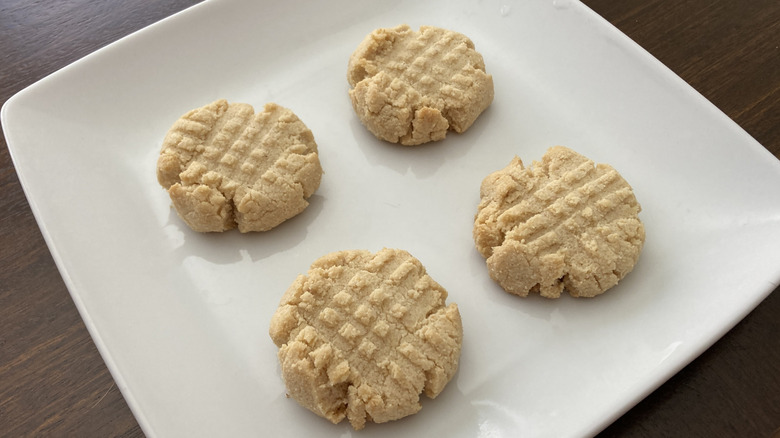
Steven Luna/Mashed
To see how well Costco and Sam's Club's sweet cream butters stood up to the task of baking, I used a simple almond flour shortbread recipe split in half, with one portion using each warehouse's buttery contribution. One of the biggest mistakes everyone makes when cooking with butter is thinking you can substitute margarine and get the same results. Thankfully, having quality butters at both Costco and Sam's Club means you can depend on the finished texture of your baked goods being up to par, as long as you measure properly and compensate for the salt in the salted sweet cream.
But does that mean that the finished products made from both are indistinguishable from one another? As far as my test is concerned, it absolutely does. From the color to the texture to the flavor, I was unable to tell the cookies made from Costco butter from the ones made with Sam's Club butter. If I hadn't denoted which brand was on which side of the pan, I would not have known they were from two different sets of ingredients. It's another tie for two premium butters that offer equal dependability in the kitchen when baking is the chosen project.
There's a seven cent difference between these brands' prices
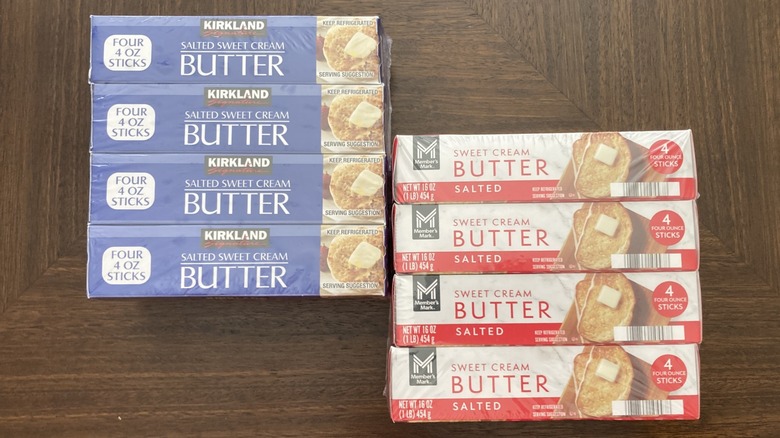
Steven Luna/Mashed
I was hoping there would be at least a significant price difference between Costco's and Sam's Club's sweet cream butters. It would have given me something juicy to chew on while writing about all the similarities that make the butter great but the comparison rather bland. Initially, I found online listings that showed Costco's four-pound package priced at $13.91, while Sam's listing showed at $11.92 — finally, a distinction to be made! I imagined the glorious prose pouring from my keyboard as I called out this glaring mismatch and assigned points to the more favorably-priced package.
But then I shopped for the butter and found out that my Costco prices its four-pound butter bundle at $11.89, which is only .07 higher than Sam's Club, and the joy drained out of me pretty quickly. It could be competitive pricing, since the two stores are less than a mile apart in my neighborhood. But that doesn't soothe the sting of yet another near-identical aspect of these two brands. No matter where you shop, you're getting pretty much the same butter for just about the same price. Considering grocery store prices hover around $5.00 or more for just a single one-pound box, your money goes much further at both warehouse outlets.
Costco and Sam's Club sell similar quantities and varieties of their butter
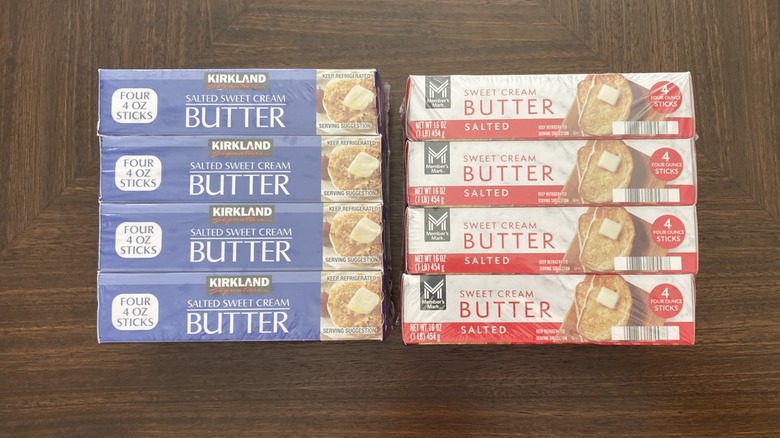
Steven Luna/Mashed
There's no difference in the quantities in Costco and Sam's Club sweet cream butter. You can pick up one-pound boxes in a four-pack of either brand, which provides plenty of butter for major kitchen adventures to ensue. It also means that you can team up with the other cooks in your life and parse out a single purchase to make your butter budget stretch a little further, if you don't need quite as much in a single buy at either warehouse net you.
The bit of variety offered by both chains is also handy for picking up the right kind of sweet cream butter for your needs. Both Costco and Sam's Club offer salted and unsalted versions, an aspect which may seem minor unless you're watching your sodium intake or are particular about controlling the saltiness of your recipes. And if you're a frequent baker or run a baking business and need massive quantities of butter in a single go, Costco offers a box of four 1-pound blocks to keep you from having to unwrap individual cubes. This is fantastic for minimizing waste from extra packaging while making it easier for you to drop an entire pound of butter in your mixing bowl all at once.
Verdict: Both butters are equally premium picks for all of your kitchen needs

Steven Luna/Mashed
It's eerie how distinguishable Costco sweet cream butter is from Sam's Club. Everything from the size and shape of the sticks to the taste and texture and even the wrappers are identical. If I didn't know that I had purchased a box from each store, I would have no idea that these were two different products. While other companies do their darndest to distinguish their items from the competition, butter is one sector in which Costco and Sam's Club seem to relish the overlap; it's easy to imagine the crossover business that can be done when customers realize they have great options no matter where they shop.
In the real world, there would no way to tell which butter is better unless you do your own taste and usability tests, which can result in big shopping expenses and the realization that you've just bought two practically identical boxes of butter. It never would have occurred to me that these proprietary brands would turn out butters that are so undeniably similar. There may be many ways in which Sam's Club is better than Costco, and just as many ways in which Costco bests Sam's Club. But thanks to this comparison and taste test, we all know now that no matter which warehouse chain you choose, both of these popular butters are equally great buys.
How I made my comparison
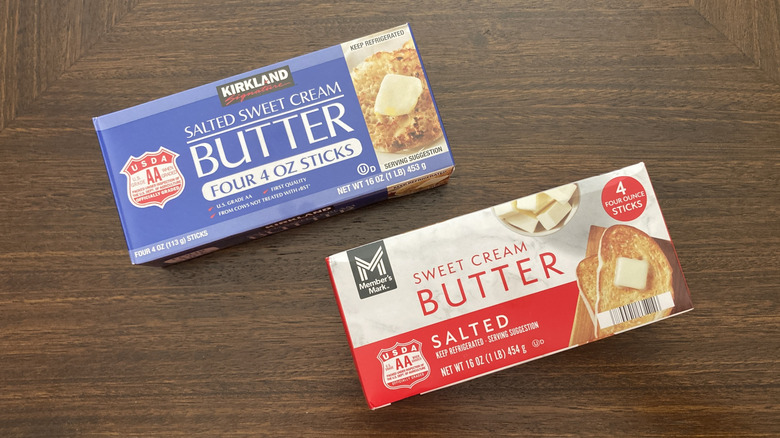
Steven Luna/Mashed
For me, a less-complicated form of butter that tastes great and performs its culinary tasks well is worth the cost. Ordinarily, this would make it easy to choose a winner; the product with the shorter list of ingredients consisting of recognizable elements would be a shoo-in. Unfortunately, because both Costco and Sam's Club use the same formulation in their butters, other aspects should have provided more information regarding their individual pros and cons.
I did my best to give each brand its own opportunity to shine, watching for the melting factor on baked potatoes, spreading it over warm homemade toast, and using it to make almond flour shortbread cookies from scratch. At every turn, the two butters were neck and neck; at no point did one brand offer an advantage over the other. Even the fact that the wrapper inside the boxes are the very same (an industry template, maybe?) led me to believe that shoppers might be given only one option sold in different warehouse stores. I searched for evidence online to confirm this but found only the source of Costco's butter. Maybe when you distill it down to its most fundamental components, there's really only one way to create sweet cream butter. If this is the case, then both Costco and Sam's Club are giving you the most bang for your butter buck.



